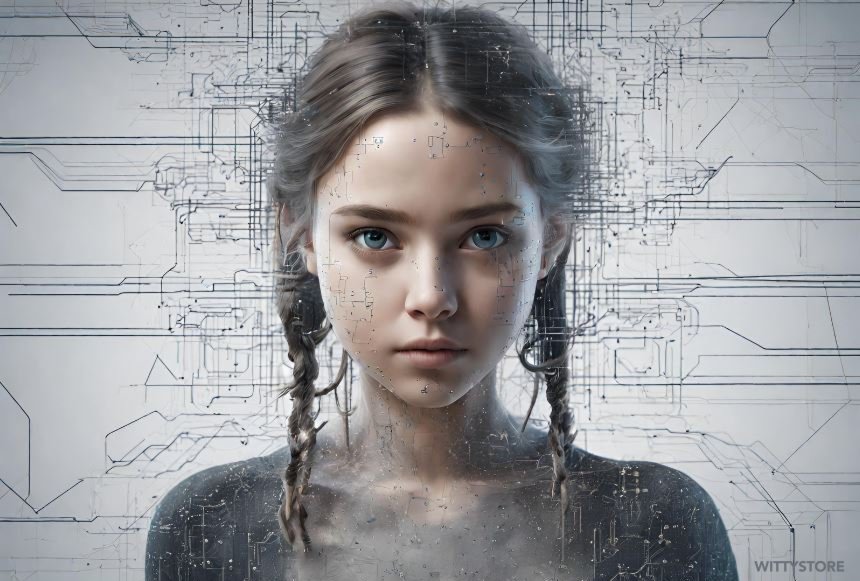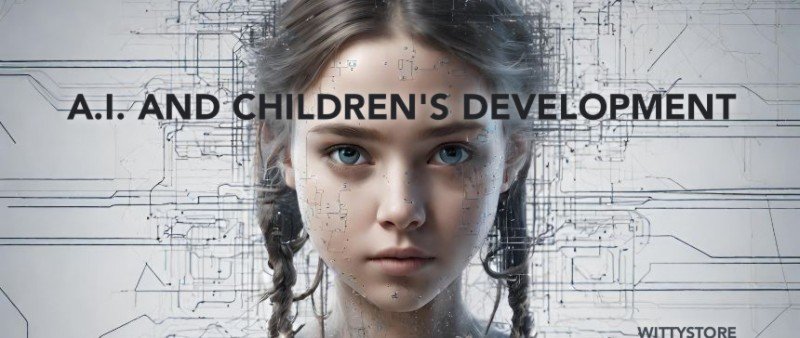1. Personalized Learning Experiences: Nurturing Individuality in Education
In the digital era, the integration of AI into education signifies a paradigm shift, echoing the sentiments expressed by UNICEF. The focus extends beyond traditional pedagogical methods, towards fostering personalized learning experiences that cater to the unique needs and learning styles of individual children.
AI in Education: A Catalyst for Personalized Growth
Educational systems powered by AI algorithms are at the forefront of revolutionizing how children learn. Adaptive learning platforms, as envisioned by UNICEF, go beyond the one-size-fits-all model, tailoring educational content, pacing, and difficulty levels to suit the specific needs of each child. This approach transcends conventional teaching methods, ensuring that no child is left behind in the pursuit of knowledge.
Realizing Potential: Case Studies in Personalized Learning
To substantiate these claims, real-world examples showcase the transformative power of AI in education. Initiatives such as AI-driven tutoring systems, personalised learning apps, and intelligent educational games have demonstrated tangible improvements in individual learning outcomes. By adapting to a child's strengths and addressing their weaknesses, AI-powered tools create an environment that nurtures intellectual growth on a personalised level.

AI and worried young girl's portrait, image copyright: wittystore.com
2. Enhancing Creativity and Imagination: AI as a Gateway to Innovative Expression
Building upon insights from the World Economic Forum, AI becomes a catalyst for unlocking the creative potential within children. Beyond the realms of traditional education, AI-driven tools stimulate innovative expression, fostering creativity and imagination through interactive storytelling, AI-generated art, and beyond.
AI and Creative Exploration: A Dynamic Duo
The infusion of AI into creative processes opens new avenues for children to explore their imagination. AI-generated art, as highlighted by the World Economic Forum, is a prime example of how technology can serve as a muse for creativity. Whether it's collaborating with AI algorithms to create unique visual pieces or engaging with interactive storytelling experiences, children are exposed to innovative means of expression that transcend conventional boundaries.
Beyond Boundaries: The Impact of AI on Artistic Endeavours
Examining the influence of AI-generated art on children's creativity reveals a fascinating interplay between technology and artistic expression. AI tools act as co-creators, inspiring children to experiment with unconventional ideas and embrace the limitless possibilities that emerge from this symbiotic relationship. The result is not only visually stimulating but also indicative of the profound impact AI can have on nurturing artistic inclinations from a young age.
3. Augmented Assistance for Special Needs: AI's Role in Inclusive Education
The UNICEF report underscores the transformative role of AI in creating inclusive learning environments, particularly for children with learning disabilities. AI serves as an augmentative tool, providing adaptive resources and personalized assistance, thereby reshaping the landscape of special needs education.
AI as an Educational Equalizer
For children with learning disabilities, traditional educational approaches often pose challenges. AI steps in as a supportive ally, addressing individual needs with unparalleled adaptability. Speech recognition, text-to-speech applications, and other AI technologies, as highlighted by UNICEF, become essential components of a toolkit designed to enhance the learning experience for every child, regardless of their unique abilities.
Empowering Differences: Success Stories in Inclusive Education
Examining success stories in the realm of inclusive education reveals the profound impact of AI on empowering children with diverse learning needs. Through AI-driven interventions, educators and parents witness significant improvements in the engagement, comprehension, and overall educational experiences of children with special needs. These success stories not only highlight the potential of AI but also emphasize the ethical imperative of ensuring that technology caters to the needs of all children, regardless of their cognitive differences.
4. Addressing Concerns: Privacy, Bias, and Screen Time Management
While the positive impact of AI on children's development is evident, addressing potential concerns is imperative to ensure responsible integration. The World Economic Forum highlights key areas of concern, including privacy and data security, safeguarding against biases, and managing screen time effectively.
Privacy and Data Security: The Cornerstone of Ethical AI
In an era where data is a valuable commodity, concerns regarding privacy and data security loom large. Striking a delicate balance between personalized learning experiences and safeguarding children's data is a shared priority. As echoed by the World Economic Forum, robust regulations and parental controls emerge as crucial components in preserving the integrity of children's information within the AI landscape.
Guardians of Privacy: Implementing Ethical AI Practices
Exploring ethical considerations in AI development unveils the need for a collective commitment to privacy. Implementing stringent guidelines, transparent data practices, and informed consent mechanisms become imperative to foster trust among parents and educators. By adopting a proactive stance on privacy, the integration of AI in children's education can proceed responsibly, ensuring that data remains a tool for empowerment rather than a source of vulnerability.
Safeguarding Against Biases: Towards Unbiased AI Development
The inadvertent perpetuation of biases by AI systems poses a significant challenge. UNICEF underscores the importance of diverse and unbiased datasets as a preventive measure. Acknowledging and rectifying biases within AI algorithms becomes crucial to prevent the reinforcement of stereotypes and discriminatory outcomes.
Ethical Algorithm Design: Mitigating Bias in AI Systems
Delving into the realm of algorithmic design reveals the intricacies involved in mitigating biases. Ethical AI development necessitates continuous scrutiny of algorithms, ensuring that training datasets represent the diversity of the intended user base. Collaborative efforts between technologists, ethicists, and educators become essential in refining algorithms to be truly impartial and inclusive.
Striking a Balance with Screen Time: Promoting Digital Well-being
Managing screen time effectively is a concern echoed by the World Economic Forum, aligning with broader discussions on digital well-being. While AI-powered educational tools are transformative, excessive screen time can impact children's physical and social development negatively.
The Art of Balance: Fostering Healthy Screen Time Habits
Guiding children towards responsible technology use involves collaborative efforts from parents, educators, and technology developers. Implementing age-appropriate guidelines, encouraging outdoor activities, and promoting a healthy balance between screen time and other activities are integral aspects of fostering digital well-being. By adopting a holistic approach, stakeholders can ensure that AI's role in children's development is a positive and enriching experience.
5. Looking Ahead: Collaborative Pathways for a Positive Future
As we navigate the evolving landscape of AI and children's development, insights from MIT Media Lab provide a deeper understanding of the collaborative efforts required to shape a positive future. Collaboration among educators, parents, policymakers, and technologists emerges as a cornerstone in ensuring responsible AI integration for the benefit of our youngest generation.
Collaborative Frameworks: A Blueprint for Success
MIT Media Lab's emphasis on collaboration serves as a blueprint for shaping the future of AI in education. Establishing collaborative frameworks involves fostering open communication channels, sharing best practices, and engaging in ongoing dialogue to address emerging challenges. By building bridges between stakeholders, we lay the foundation for a harmonious integration of AI that aligns with ethical considerations and best practices.
Innovation Through Collaboration: Case Studies from MIT Media Lab
Examining MIT Media Lab's ongoing research initiatives unravels a tapestry of innovation driven by collaboration. Case studies showcasing successful implementations of AI in educational settings provide tangible evidence of the positive impact of collaborative efforts. From cutting-edge technologies to adaptive learning platforms, these initiatives serve as beacons of inspiration for educators and technologists alike.

AI and Children's developement, image copyright: wittystore.com
Expanding Horizons: Real-world Examples and Ongoing Initiatives
Expanding on the article involves delving into real-world examples and ongoing initiatives that illustrate the transformative power of AI in children's development.
Real-world Examples: AI Transforming Early Childhood Education
Exploring real-world examples involves delving into initiatives that have successfully implemented AI in early childhood education. From AI-driven interactive learning games to virtual tutors, these examples offer concrete evidence of the positive impact AI can have on early childhood learning outcomes.
Transformative Success: AI in Action
Examining case studies of schools or organizations that have embraced AI in early childhood education provides valuable insights into the transformative success stories. Whether it's enhancing literacy skills through AI-driven language apps or fostering creativity through interactive storytelling, these examples showcase the tangible benefits of AI in action.
Ongoing Research Initiatives: The Frontiers of AI and Child Development
MIT Media Lab's ongoing research initiatives offer a glimpse into the frontiers of AI and child development. By exploring the latest advancements in AI technologies designed with children's development in mind, we gain a deeper understanding of the potential future trajectories for AI in education.
Innovations on the Horizon: Insights from MIT Media Lab
Insights from MIT Media Lab's researchers and innovators provide a window into the innovations on the horizon. Whether it's exploring the intersection of AI and social-emotional learning or pushing the boundaries of AI-generated content, ongoing research initiatives serve as a compass guiding us towards new possibilities and avenues for exploration.
6. In Conclusion: Shaping a Future of Responsible AI Integration
By continuously assessing the evolving landscape, addressing challenges, and responsibly leveraging the potential of AI, we can shape a future where technology enhances, rather than hinders, the holistic development of our youngest generation. The collaborative efforts advocated by UNICEF, the World Economic Forum, and MIT Media Lab underscore the importance of a united front in navigating the complex intersection of AI and children's development.
Author: Eleanor J. Harrington
Disclaimer: The views and opinions expressed in this article are those of the author and do not necessarily reflect the official policy or position of Wittystore.com.
Sources:
- UNICEF Innovation (2018) [Children and AI].
- World Economic Forum (2022) [Artificial Intelligence, Children, and Technology].
- MIT Media Lab (n.d.) [How will AI technologies affect child development?].






